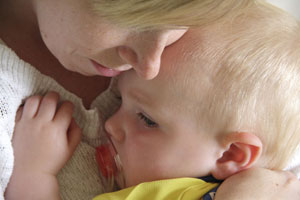Fever without fear
Fevers can be scary for parents. When your baby is burning up, it can be hard to think straight and make important decisions. A fever in a newborn should not be taken lightly but it helps to know when to take action and when to let it run its course.
When the body detects an infection or other illness, the brain responds by raising the body temperature to help fight the condition. For babies, a rectal temperature over 100.3 F is considered a fever.
Taking temps
Although there are numerous thermometers on the market, rectal thermometers are best for babies less than one year old for getting an accurate temperature.
Fighting fever
Acetaminophen or ibuprofen usually reduce a fever. Contact your health care provider for the correct dosage. Ibuprofen can be given after 6 months of age.
- Don’t overdress your child.
- Offer your baby plenty of fluids to avoid dehydration.
When to call the doctor
Contact your health care provider if your child is:
- Younger than 3 months old and has a fever.
- Acting tired or sleepier than normal, unresponsive, refuses to eat, has a rash, or is having difficulty breathing.
- Dehydrated (signs include dry mouth, a sunken soft spot or significantly fewer wet diapers).
- Feverish for more than a few days or still has a fever after getting acetaminophen or ibuprofen.
- Experiencing other symptoms such as an unexplained rash or repeated vomiting/diarrhea.
- Having a febrile seizure.
Febrile seizures
A febrile seizure is a relatively common and generally harmless side effect of fevers in young children. It’s a full-body seizure where your child may be unresponsive, look strange, twitch, stiffen or roll his/her eyes.
Remain calm and move your child to a safe place. Do not put anything in his/her mouth. Febrile seizures usually last less than one minute, but can last up to 15 minutes. Call 911 if the seizure lasts longer than a few minutes. Follow up with your health care provider for all febrile seizures.
